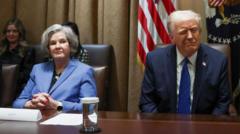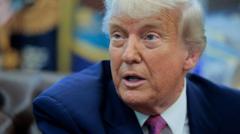A recent US federal court ruling has invalidated President Trump's broad tariffs, presenting a significant challenge to one of his primary economic strategies. The U.S. Court of International Trade determined that an emergency law used by the Trump administration did not authorize the President to set tariffs on a wide array of countries. The court highlighted that only Congress holds the authority to manage international commerce, which cannot be overridden by the President's responsibility to protect the economy. Following the ruling, the Trump administration quickly appealed the decision.
**US Court Strikes Down Trump's Tariffs in Landmark Ruling**

**US Court Strikes Down Trump's Tariffs in Landmark Ruling**
A federal judge nullifies Trump's tariff policies, emphasizing Congressional authority over trade.
The court decision also rebuked other tariffs imposed by Trump on countries including China, Mexico, and Canada, enacted in response to what was termed a national emergency concerning drugs and illegal immigration. In defense of the tariffs, White House Deputy Press Secretary Kush Desai asserted the necessity of Presidential power in these matters. He characterized the ruling as an overreach of judicial authority, reaffirming Trump's commitment to prioritizing American interests. The legal action was initiated by the Liberty Justice Center, representing small businesses affected by the tariffs, marking a significant legal confrontation against Trump's trade policies.
New York Attorney General Letitia James, among 12 states backing the lawsuit, voiced support for the ruling, characterizing the tariffs as unjust tax increases on American families and businesses. The court's decision stemmed from its interpretation of the International Emergency Economic Powers Act (IEEPA) of 1977, which Trump cited as justification for the tariffs; the judges ruled that this act did not grant him the expansive authority he sought. The invalidation of these tariffs has led to a surge in stock markets, with international traders responding positively to the prospects of a less turbulent economic environment. The US dollar increased against several other currencies following the ruling, indicating positive market sentiment.
The ruling underscores ongoing legal disputes regarding the Trump administration's trade strategies, as several cases remain active, highlighting the complexities of power and authority related to international trade.
New York Attorney General Letitia James, among 12 states backing the lawsuit, voiced support for the ruling, characterizing the tariffs as unjust tax increases on American families and businesses. The court's decision stemmed from its interpretation of the International Emergency Economic Powers Act (IEEPA) of 1977, which Trump cited as justification for the tariffs; the judges ruled that this act did not grant him the expansive authority he sought. The invalidation of these tariffs has led to a surge in stock markets, with international traders responding positively to the prospects of a less turbulent economic environment. The US dollar increased against several other currencies following the ruling, indicating positive market sentiment.
The ruling underscores ongoing legal disputes regarding the Trump administration's trade strategies, as several cases remain active, highlighting the complexities of power and authority related to international trade.






















